Case Study Analysis: Ethics and Professional Practice for Programmers
VerifiedAdded on 2022/08/21
|5
|1090
|10
Case Study
AI Summary
This case study examines the ethical challenges faced by John, a statistical database programmer, who copied code from a co-worker and commercial software to complete a project under pressure. The analysis utilizes the Thomas White Methodology and considers the relevant ACS code of ethics to evaluate the consequences of John's actions, including the lack of acknowledgment for his co-worker's contribution and the potential impact on his professional development and the integrity of the project. The study explores various scenarios and provides recommendations regarding the actions John should have taken to uphold ethical standards, such as acknowledging the co-worker's work and seeking assistance from management. The study highlights the primacy of public interest over other ACS values in this context and emphasizes the importance of honesty, competence, and professionalism in software development.
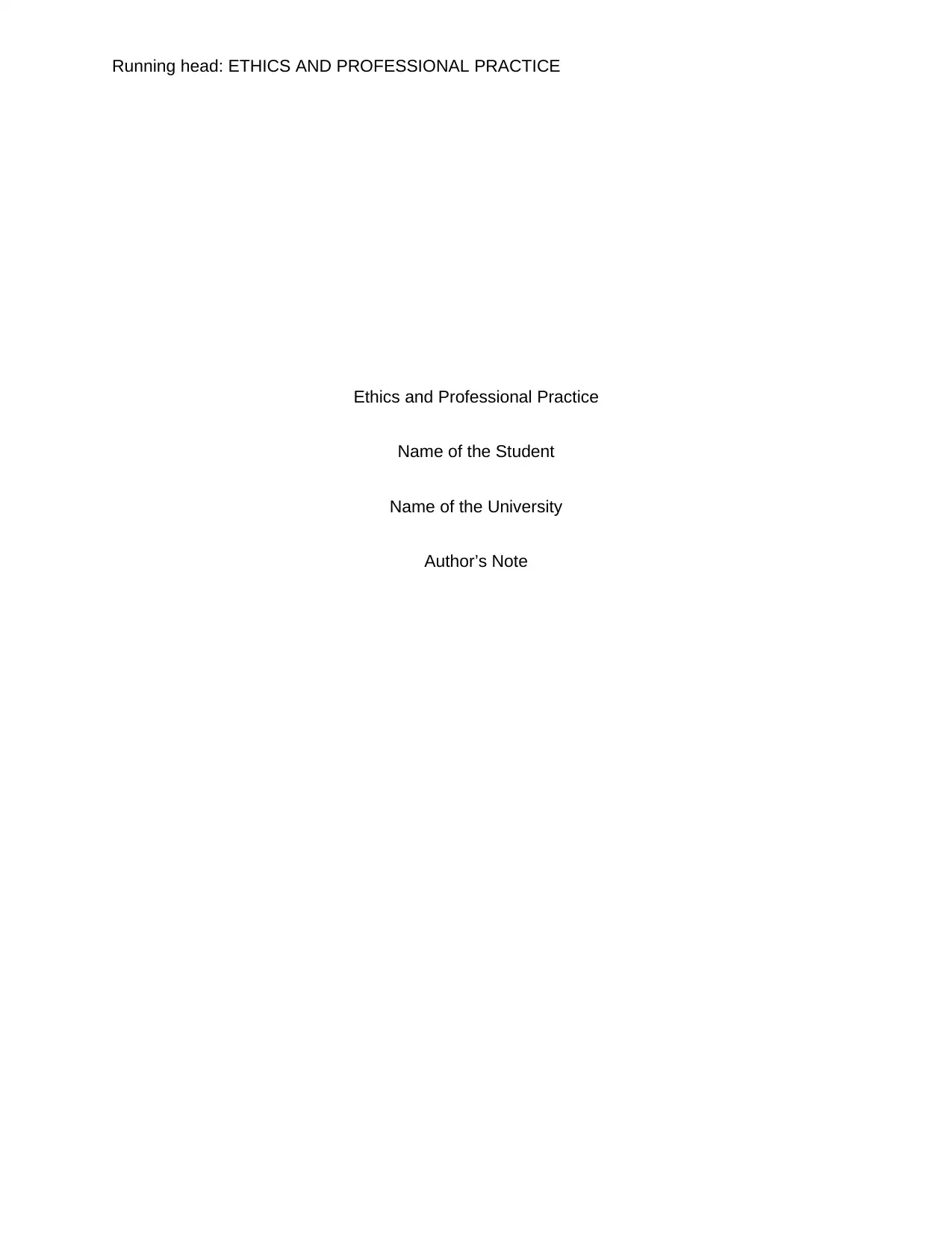
Running head: ETHICS AND PROFESSIONAL PRACTICE
Ethics and Professional Practice
Name of the Student
Name of the University
Author’s Note
Ethics and Professional Practice
Name of the Student
Name of the University
Author’s Note
Paraphrase This Document
Need a fresh take? Get an instant paraphrase of this document with our AI Paraphraser
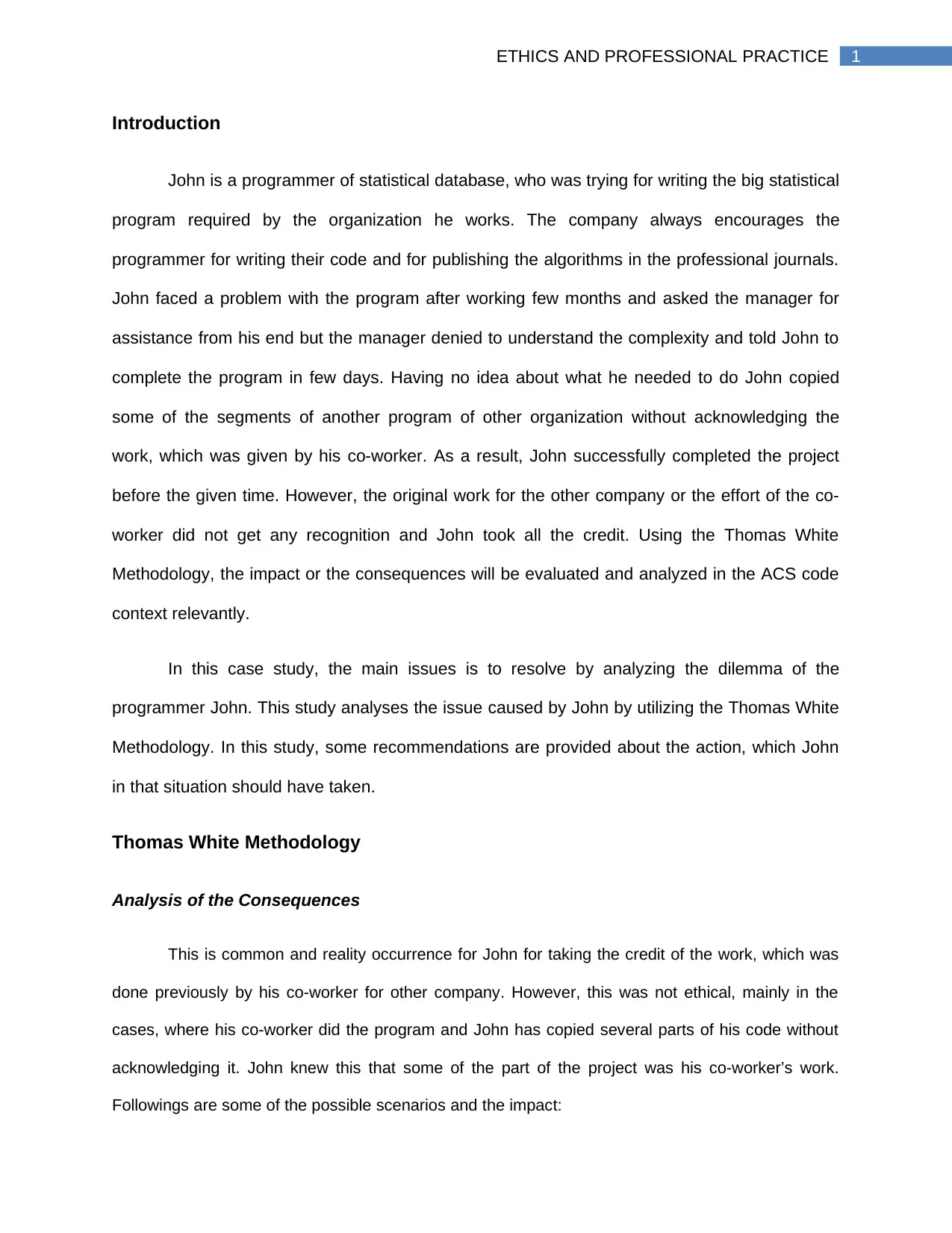
1ETHICS AND PROFESSIONAL PRACTICE
Introduction
John is a programmer of statistical database, who was trying for writing the big statistical
program required by the organization he works. The company always encourages the
programmer for writing their code and for publishing the algorithms in the professional journals.
John faced a problem with the program after working few months and asked the manager for
assistance from his end but the manager denied to understand the complexity and told John to
complete the program in few days. Having no idea about what he needed to do John copied
some of the segments of another program of other organization without acknowledging the
work, which was given by his co-worker. As a result, John successfully completed the project
before the given time. However, the original work for the other company or the effort of the co-
worker did not get any recognition and John took all the credit. Using the Thomas White
Methodology, the impact or the consequences will be evaluated and analyzed in the ACS code
context relevantly.
In this case study, the main issues is to resolve by analyzing the dilemma of the
programmer John. This study analyses the issue caused by John by utilizing the Thomas White
Methodology. In this study, some recommendations are provided about the action, which John
in that situation should have taken.
Thomas White Methodology
Analysis of the Consequences
This is common and reality occurrence for John for taking the credit of the work, which was
done previously by his co-worker for other company. However, this was not ethical, mainly in the
cases, where his co-worker did the program and John has copied several parts of his code without
acknowledging it. John knew this that some of the part of the project was his co-worker’s work.
Followings are some of the possible scenarios and the impact:
Introduction
John is a programmer of statistical database, who was trying for writing the big statistical
program required by the organization he works. The company always encourages the
programmer for writing their code and for publishing the algorithms in the professional journals.
John faced a problem with the program after working few months and asked the manager for
assistance from his end but the manager denied to understand the complexity and told John to
complete the program in few days. Having no idea about what he needed to do John copied
some of the segments of another program of other organization without acknowledging the
work, which was given by his co-worker. As a result, John successfully completed the project
before the given time. However, the original work for the other company or the effort of the co-
worker did not get any recognition and John took all the credit. Using the Thomas White
Methodology, the impact or the consequences will be evaluated and analyzed in the ACS code
context relevantly.
In this case study, the main issues is to resolve by analyzing the dilemma of the
programmer John. This study analyses the issue caused by John by utilizing the Thomas White
Methodology. In this study, some recommendations are provided about the action, which John
in that situation should have taken.
Thomas White Methodology
Analysis of the Consequences
This is common and reality occurrence for John for taking the credit of the work, which was
done previously by his co-worker for other company. However, this was not ethical, mainly in the
cases, where his co-worker did the program and John has copied several parts of his code without
acknowledging it. John knew this that some of the part of the project was his co-worker’s work.
Followings are some of the possible scenarios and the impact:
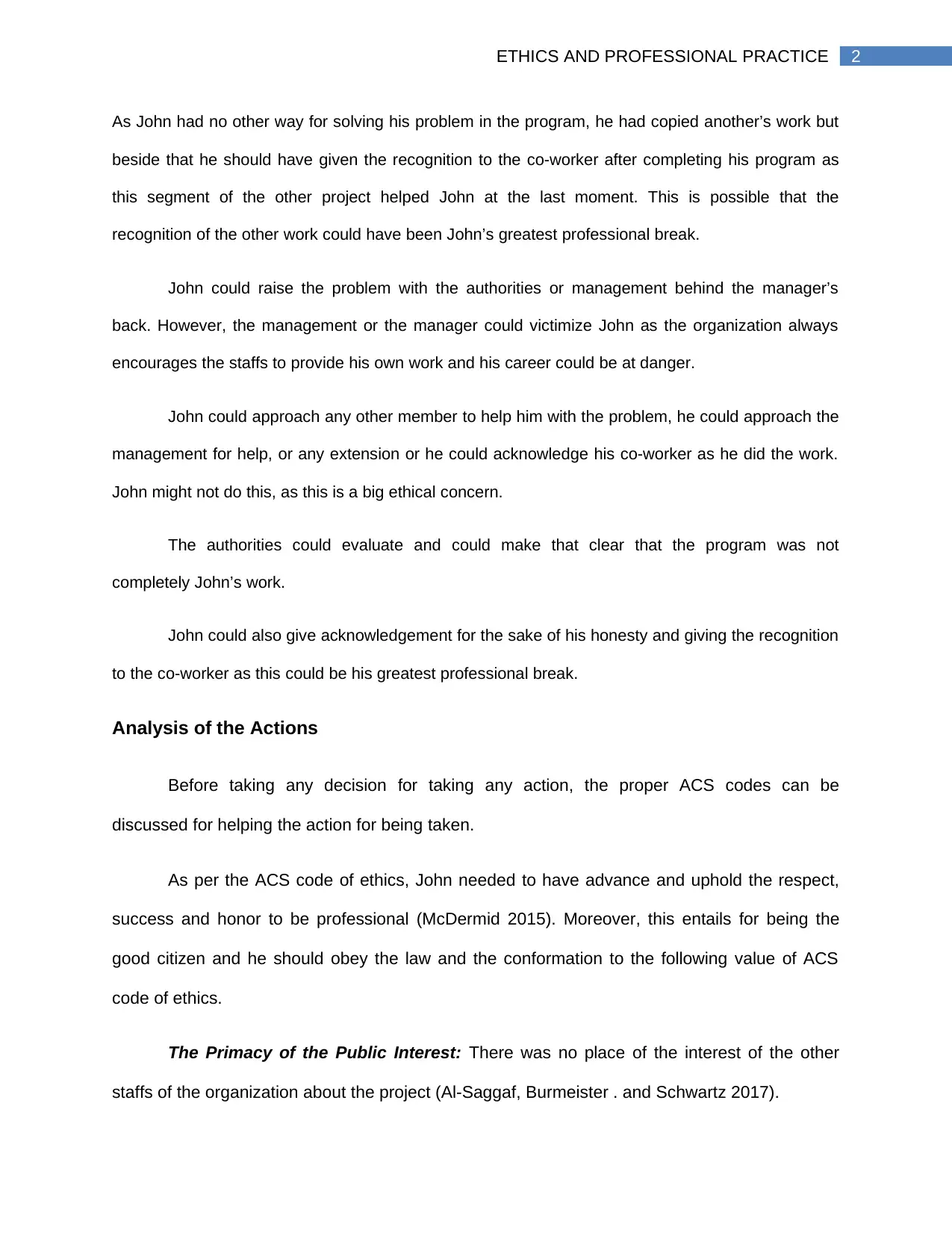
2ETHICS AND PROFESSIONAL PRACTICE
As John had no other way for solving his problem in the program, he had copied another’s work but
beside that he should have given the recognition to the co-worker after completing his program as
this segment of the other project helped John at the last moment. This is possible that the
recognition of the other work could have been John’s greatest professional break.
John could raise the problem with the authorities or management behind the manager’s
back. However, the management or the manager could victimize John as the organization always
encourages the staffs to provide his own work and his career could be at danger.
John could approach any other member to help him with the problem, he could approach the
management for help, or any extension or he could acknowledge his co-worker as he did the work.
John might not do this, as this is a big ethical concern.
The authorities could evaluate and could make that clear that the program was not
completely John’s work.
John could also give acknowledgement for the sake of his honesty and giving the recognition
to the co-worker as this could be his greatest professional break.
Analysis of the Actions
Before taking any decision for taking any action, the proper ACS codes can be
discussed for helping the action for being taken.
As per the ACS code of ethics, John needed to have advance and uphold the respect,
success and honor to be professional (McDermid 2015). Moreover, this entails for being the
good citizen and he should obey the law and the conformation to the following value of ACS
code of ethics.
The Primacy of the Public Interest: There was no place of the interest of the other
staffs of the organization about the project (Al-Saggaf, Burmeister . and Schwartz 2017).
As John had no other way for solving his problem in the program, he had copied another’s work but
beside that he should have given the recognition to the co-worker after completing his program as
this segment of the other project helped John at the last moment. This is possible that the
recognition of the other work could have been John’s greatest professional break.
John could raise the problem with the authorities or management behind the manager’s
back. However, the management or the manager could victimize John as the organization always
encourages the staffs to provide his own work and his career could be at danger.
John could approach any other member to help him with the problem, he could approach the
management for help, or any extension or he could acknowledge his co-worker as he did the work.
John might not do this, as this is a big ethical concern.
The authorities could evaluate and could make that clear that the program was not
completely John’s work.
John could also give acknowledgement for the sake of his honesty and giving the recognition
to the co-worker as this could be his greatest professional break.
Analysis of the Actions
Before taking any decision for taking any action, the proper ACS codes can be
discussed for helping the action for being taken.
As per the ACS code of ethics, John needed to have advance and uphold the respect,
success and honor to be professional (McDermid 2015). Moreover, this entails for being the
good citizen and he should obey the law and the conformation to the following value of ACS
code of ethics.
The Primacy of the Public Interest: There was no place of the interest of the other
staffs of the organization about the project (Al-Saggaf, Burmeister . and Schwartz 2017).
⊘ This is a preview!⊘
Do you want full access?
Subscribe today to unlock all pages.

Trusted by 1+ million students worldwide
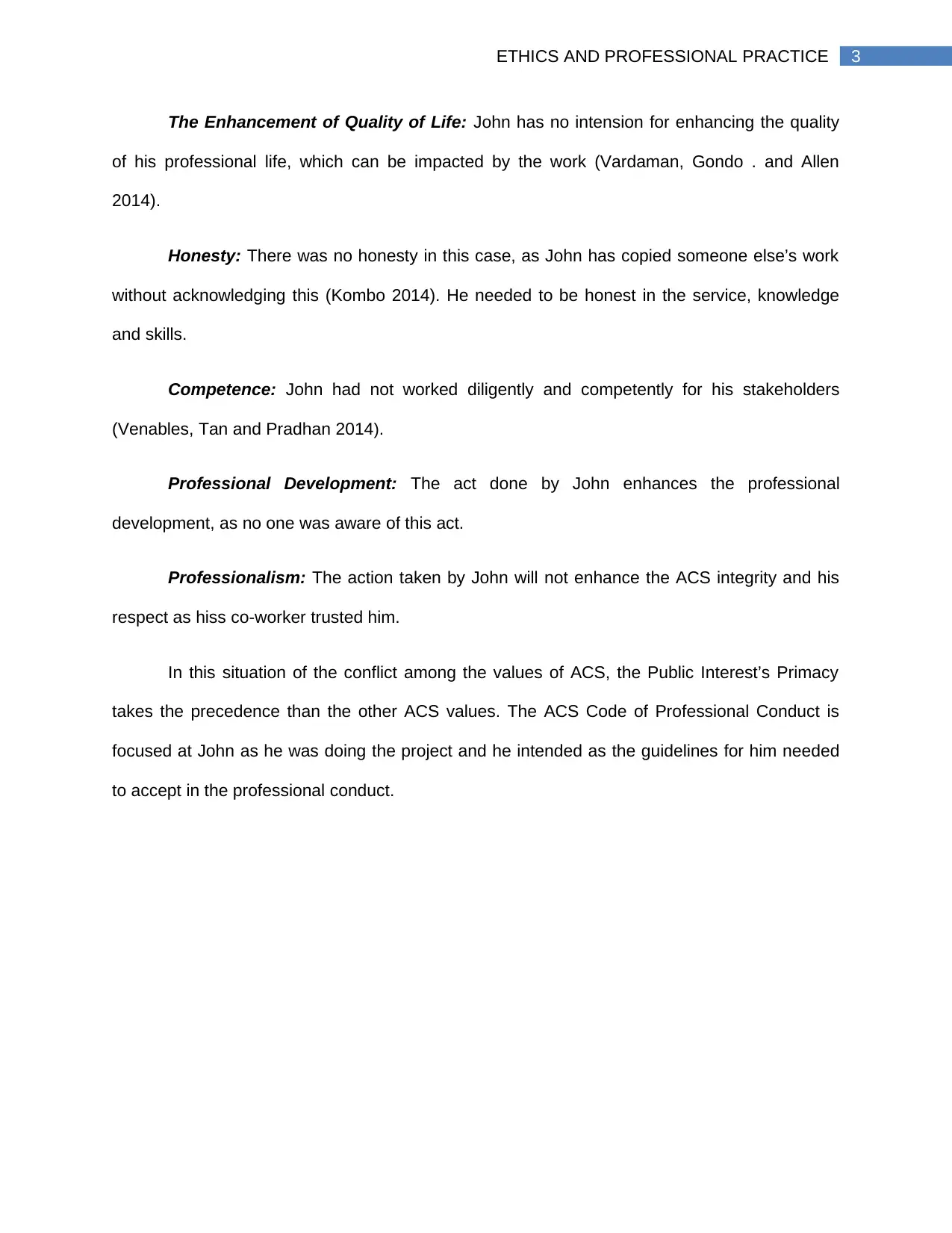
3ETHICS AND PROFESSIONAL PRACTICE
The Enhancement of Quality of Life: John has no intension for enhancing the quality
of his professional life, which can be impacted by the work (Vardaman, Gondo . and Allen
2014).
Honesty: There was no honesty in this case, as John has copied someone else’s work
without acknowledging this (Kombo 2014). He needed to be honest in the service, knowledge
and skills.
Competence: John had not worked diligently and competently for his stakeholders
(Venables, Tan and Pradhan 2014).
Professional Development: The act done by John enhances the professional
development, as no one was aware of this act.
Professionalism: The action taken by John will not enhance the ACS integrity and his
respect as hiss co-worker trusted him.
In this situation of the conflict among the values of ACS, the Public Interest’s Primacy
takes the precedence than the other ACS values. The ACS Code of Professional Conduct is
focused at John as he was doing the project and he intended as the guidelines for him needed
to accept in the professional conduct.
The Enhancement of Quality of Life: John has no intension for enhancing the quality
of his professional life, which can be impacted by the work (Vardaman, Gondo . and Allen
2014).
Honesty: There was no honesty in this case, as John has copied someone else’s work
without acknowledging this (Kombo 2014). He needed to be honest in the service, knowledge
and skills.
Competence: John had not worked diligently and competently for his stakeholders
(Venables, Tan and Pradhan 2014).
Professional Development: The act done by John enhances the professional
development, as no one was aware of this act.
Professionalism: The action taken by John will not enhance the ACS integrity and his
respect as hiss co-worker trusted him.
In this situation of the conflict among the values of ACS, the Public Interest’s Primacy
takes the precedence than the other ACS values. The ACS Code of Professional Conduct is
focused at John as he was doing the project and he intended as the guidelines for him needed
to accept in the professional conduct.
Paraphrase This Document
Need a fresh take? Get an instant paraphrase of this document with our AI Paraphraser
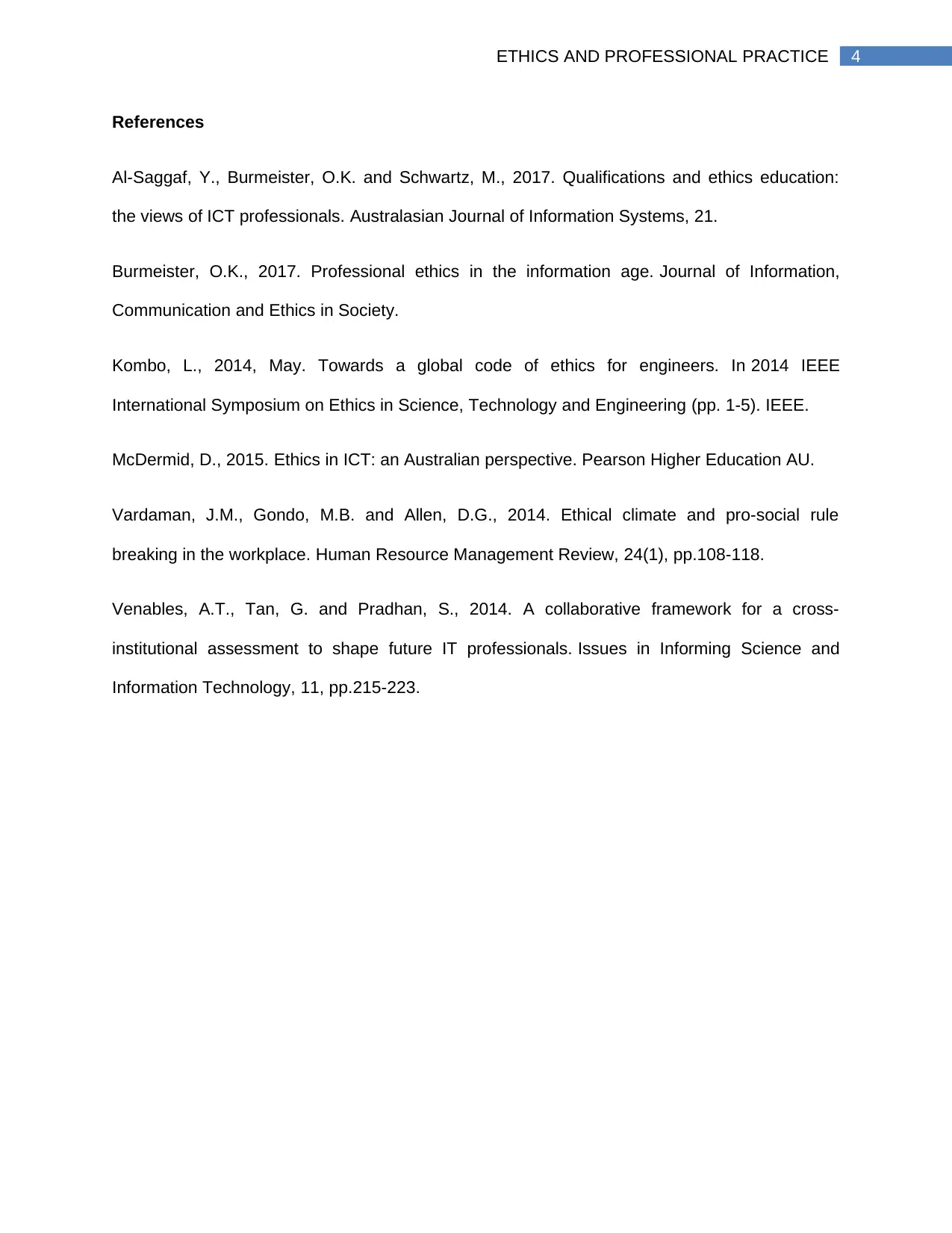
4ETHICS AND PROFESSIONAL PRACTICE
References
Al-Saggaf, Y., Burmeister, O.K. and Schwartz, M., 2017. Qualifications and ethics education:
the views of ICT professionals. Australasian Journal of Information Systems, 21.
Burmeister, O.K., 2017. Professional ethics in the information age. Journal of Information,
Communication and Ethics in Society.
Kombo, L., 2014, May. Towards a global code of ethics for engineers. In 2014 IEEE
International Symposium on Ethics in Science, Technology and Engineering (pp. 1-5). IEEE.
McDermid, D., 2015. Ethics in ICT: an Australian perspective. Pearson Higher Education AU.
Vardaman, J.M., Gondo, M.B. and Allen, D.G., 2014. Ethical climate and pro-social rule
breaking in the workplace. Human Resource Management Review, 24(1), pp.108-118.
Venables, A.T., Tan, G. and Pradhan, S., 2014. A collaborative framework for a cross-
institutional assessment to shape future IT professionals. Issues in Informing Science and
Information Technology, 11, pp.215-223.
References
Al-Saggaf, Y., Burmeister, O.K. and Schwartz, M., 2017. Qualifications and ethics education:
the views of ICT professionals. Australasian Journal of Information Systems, 21.
Burmeister, O.K., 2017. Professional ethics in the information age. Journal of Information,
Communication and Ethics in Society.
Kombo, L., 2014, May. Towards a global code of ethics for engineers. In 2014 IEEE
International Symposium on Ethics in Science, Technology and Engineering (pp. 1-5). IEEE.
McDermid, D., 2015. Ethics in ICT: an Australian perspective. Pearson Higher Education AU.
Vardaman, J.M., Gondo, M.B. and Allen, D.G., 2014. Ethical climate and pro-social rule
breaking in the workplace. Human Resource Management Review, 24(1), pp.108-118.
Venables, A.T., Tan, G. and Pradhan, S., 2014. A collaborative framework for a cross-
institutional assessment to shape future IT professionals. Issues in Informing Science and
Information Technology, 11, pp.215-223.
1 out of 5
Related Documents
Your All-in-One AI-Powered Toolkit for Academic Success.
+13062052269
info@desklib.com
Available 24*7 on WhatsApp / Email
![[object Object]](/_next/static/media/star-bottom.7253800d.svg)
Unlock your academic potential
Copyright © 2020–2026 A2Z Services. All Rights Reserved. Developed and managed by ZUCOL.




